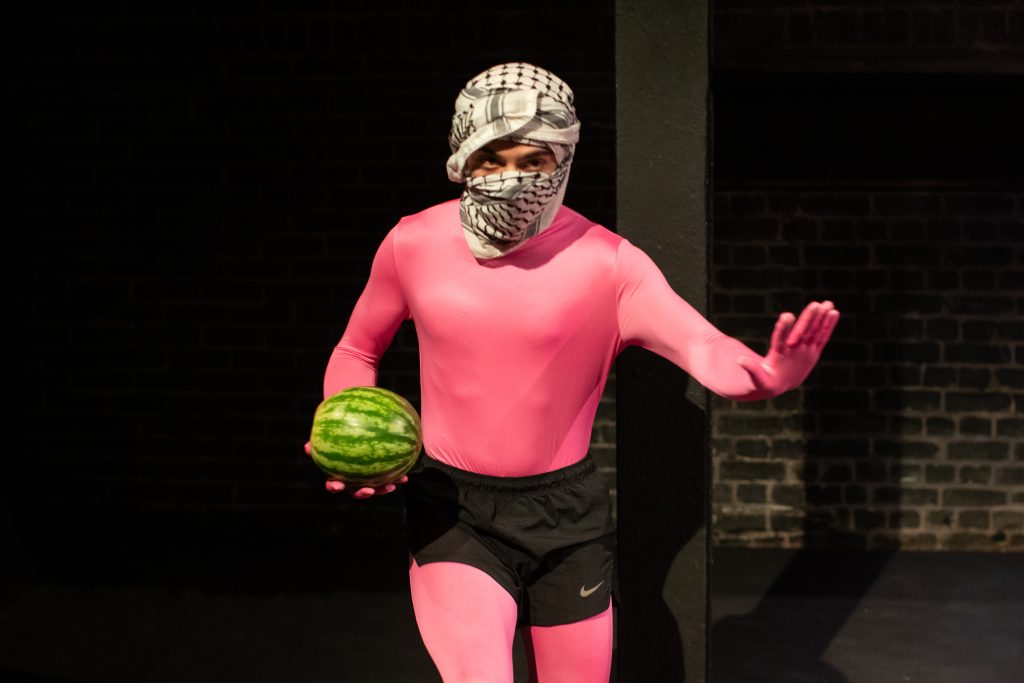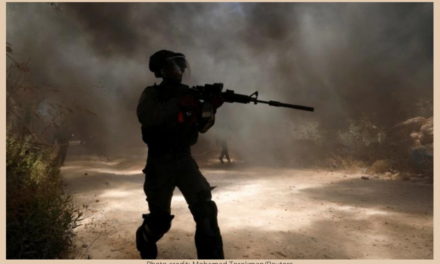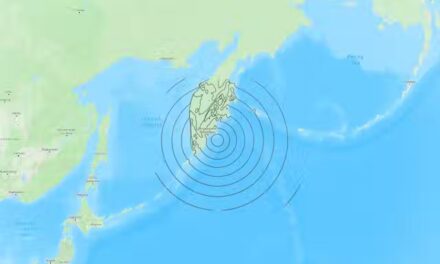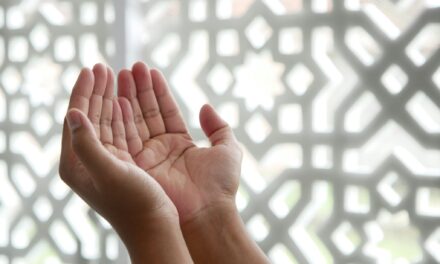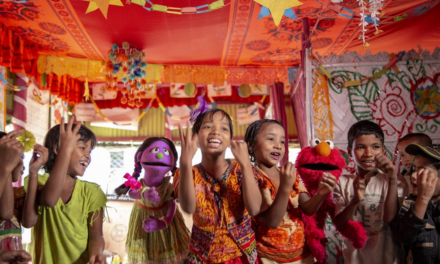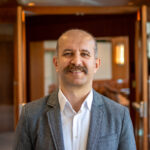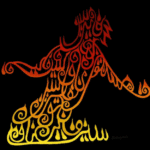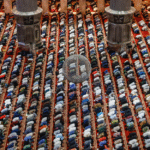Issam Al Ghussain in “Cutting The Tightrope: (Photo: Ali Wright)
When, in January, Arts Council England updated its requirements for funding to warn against “political” art, there was such outrage among artists that a month later it issued an extraordinary “clarification”: the update was only meant to minimize “the risk to themselves and crucially to their staff and to the communities they serve”.1
Disingenuous at best, the “clarification” only begged the question: The risk of what? Violence? (From whom?) Arrest? Imprisonment? Defunding? What?
By their actions, both the Arts Council and the state confirmed, All of the above. The ensuing months brought the arrests and imprisonment of people protesting UK complicity in genocide, and heightened state harassment of the few journalists actually doing journalism.
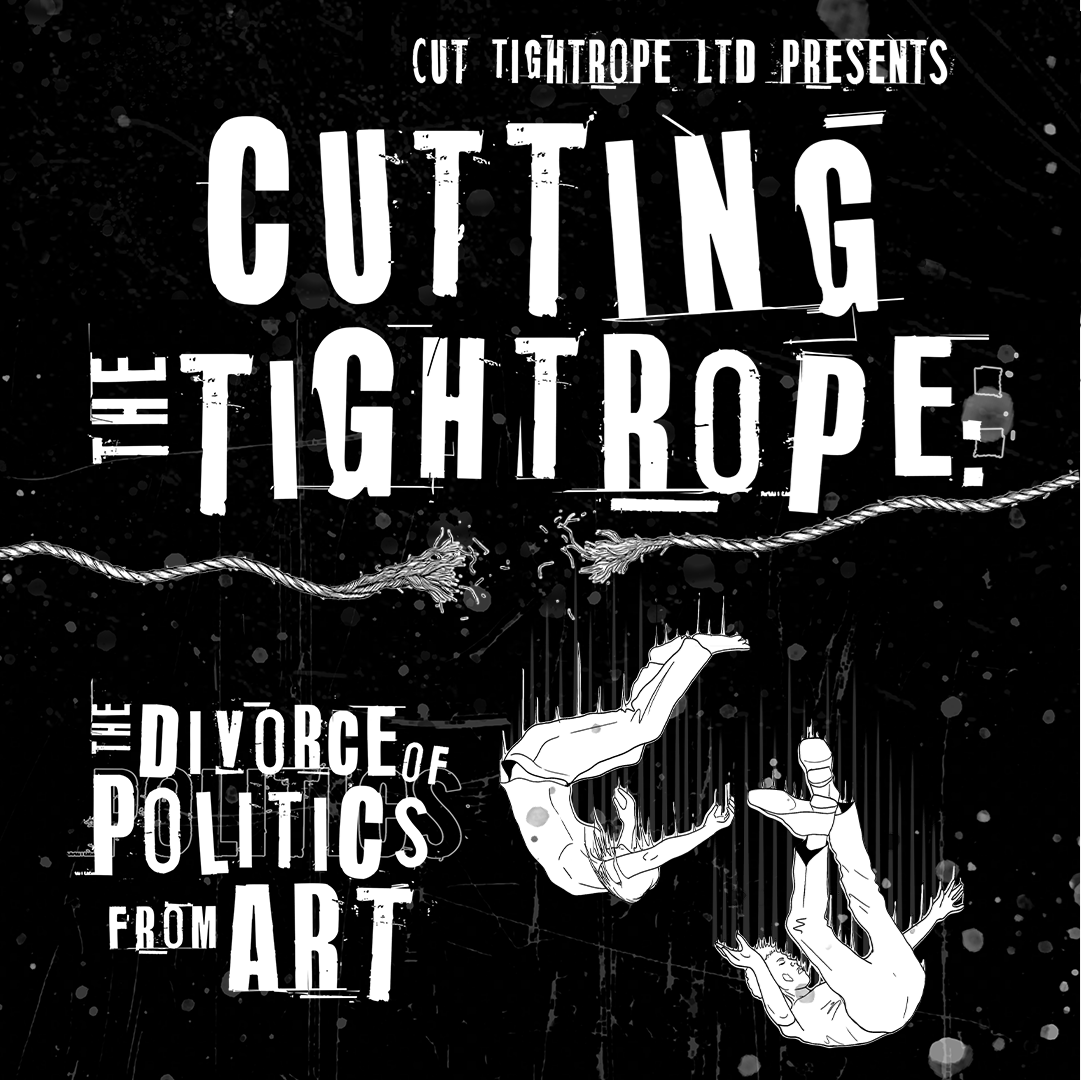
Cutting the Tightrope is a series of mini-plays addressing both the immediate reckonings of our time and the larger context in which they evolved. While the ongoing Palestinian genocide is the production’s binding glue, its breadth is wide. The audience is taken south to Sudan, backward to Britain’s colonial legacy, and globally to the crimes of — and not just — the United States.
The playwrights are listed but, for their protection, not linked to their particular work(s) — itself a damning commentary on 2024 Britain. The caution is justified. People in the UK have been arrested and convicted on terrorism charges merely for the possession of an image of a paraglider as a symbol of resistance, or any placard whose message suggests active resistance against the slaughter.
People, including most recently the child of survivors of Auschwitz, have been imprisoned for voicing solidarity with Gaza’s struggle within earshot or twitter-shot of the authorities. British journalists have been detained or arrested, and their equipment confiscated, under British “anti-terror” legislation, such as Richard Medhurst, Asa Winstanley, Sarah Wilkinson, and blogger/author Tony Greenstein. Even this writer, hardly any threat to Western hegemony(!), was once closed down by Prevent, the UK’s supposed anti-radicalization initiative. Prevent has still refused to reveal its secret charges against me, which were based on secret evidence from secret sources, or to clear my name.
In “Maulvi’s Head”, Cutting the Tightrope does indeed address one journalist targeted by the British: the scholar Moulvi Muhammad Baqir, who in 1857 became the first person executed by the colonial establishment in India for doing journalism — tied to the mouth of a cannon as was the British predilection. On the Arcola stage, the Empire, in the guise of a colonial bureaucrat determined to get Moulvi to “understand”, slowly expires as Moulvi, in the form of his head on a tea table, remains, undaunted. The novel duo roles are brilliantly brought back to life by Salman Akhtar (Maulvi) and Mark Oosterveen (the Britisher).
Interwoven throughout the evening, an agile, elusive “militant” figure (Issam Al Ghussain) dances in and out of sight balancing a symbolic watermelon in hand, at times held out in front as if he were Atlas holding the earth and its fate — which, given the iconography of Palestine as the crossroad at which humanity today finds itself, he is.
In “Dare Not Speak”, the story of Hind Rajab, the five-year-old who was executed by the IDF as she begged for help by phone inside the family car amidst the blood-strewn corpses of her already-murdered family, is so horrific that to stage it risks sensationalizing it, reducing the victim to a mere object of pity. Cutting the Tightrope instead put Hind herself on stage. Stymied by publishing-world cowardice in her simple desire to tell her story, we are subtly brought to understand that while Hind’s murder was Israeli business-as-usual, her murderers are, ultimately, us. Exquisitely acted by Sara Masry (Hind) and Ruth Lass (Natalie, publisher/agent).
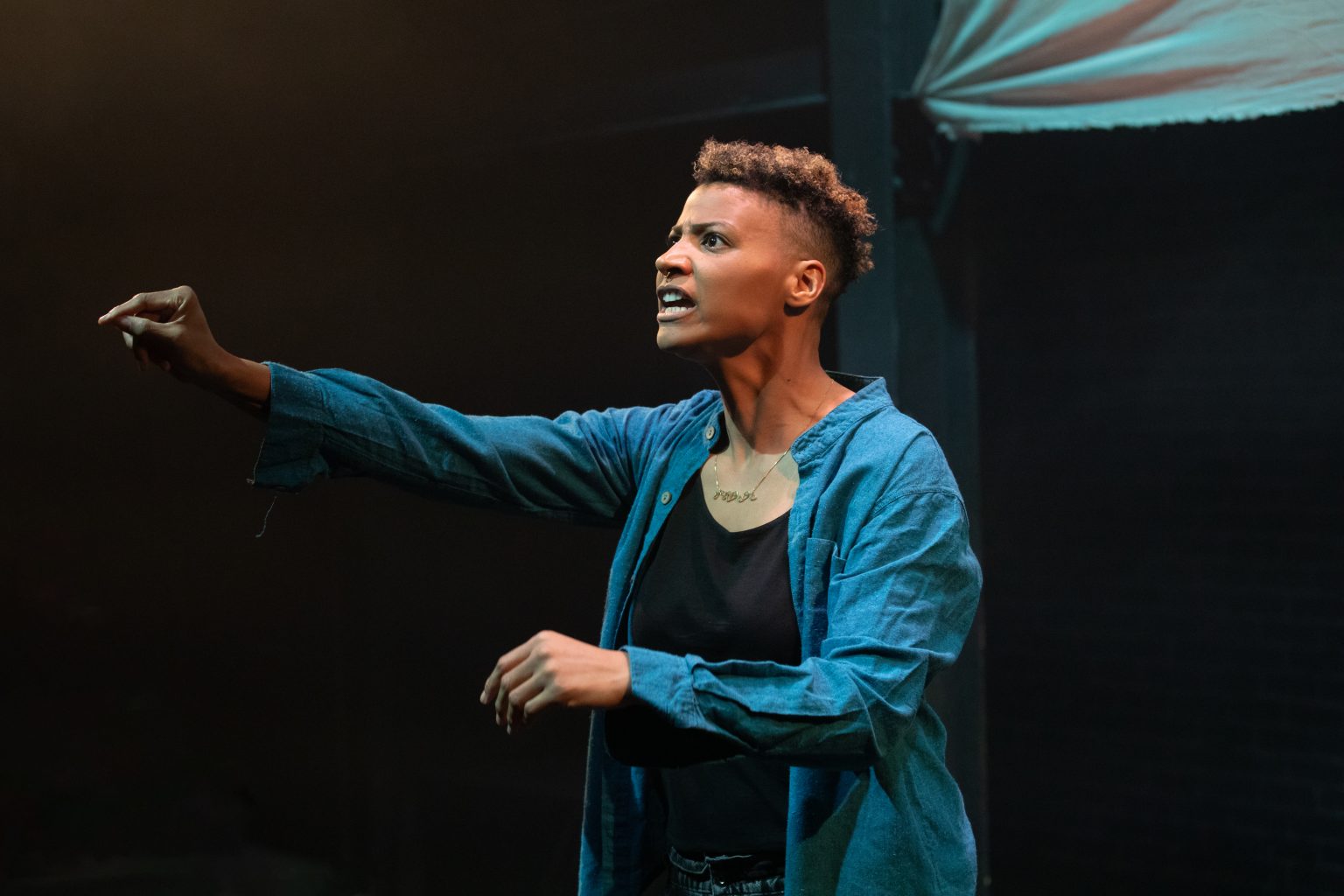
Jess Murrain in “Cutting The Tightrope” (Photo: Ali Wright)
Aptly named “Cardiac Arrest”, another segment spares nothing, a brilliantly-acted, frenetic reckoning with the litany of nation-state crimes that have brought us to where we are, but that have been so drowned out by censorship and state-obedient media “narrative” as to vanish them from our collective awareness. So organically does Jess Murrain assume the role, that one is left shell-shocked, terrified, even if we thought we knew it all.
Acted with equal brilliance, “Florist of Rafah” is a polar contrast of approach. A soft-spoken flower-seller (Waleed Elgadi) keeps one flower intact and unsold, hoping that his young daughter, separated from him as other family members were butchered in an IDF attack, will follow the scent back to him. Slowly, the audience comes to understand: he is in shock, in denial. She is not coming back. There are many Hinds.
These are just a sampling of the superb production.
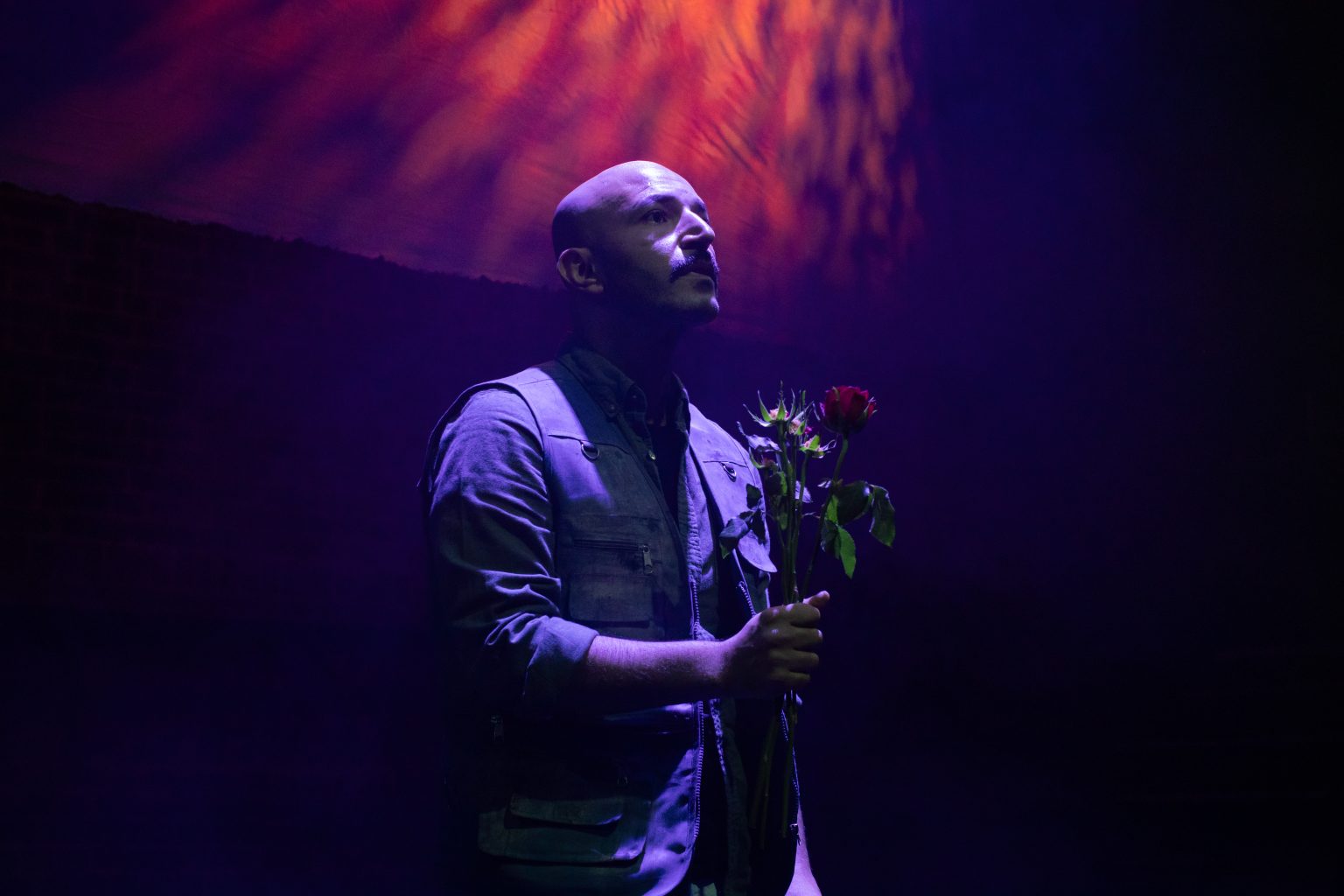
Waleed Elgadi in “Cutting The Tightrope” (Photo: Ali Wright)
Art has not merely the right, but the obligation, to address the world in which it is created. But “political art” would be vacuous, even fraudulent, if its effects evaporate outside the venue’s doors. I exited the Arcola’s doors feeling as though I’d been clobbered over the head, asking myself, Am I really doing all I can?
Indeed Cutting the Tightrope’s community of artists is proactive beyond the stage: In conjunction with Workers in Palestine and Makan, the production arranged free workshops, open to the public, to help arm people with the skills and tools to organise for, and speak about, Palestine. And every performance is followed by a panel of seasoned, knowledgeable activists, the list including such remarkable people as Andrew Feinstein (Former ANC member of Parliament, South Africa), Haim Bresheeth (ex-Israeli filmmaker), and Ahmed Masoud (Gazan playwright and novelist).
If you are within reach of London, Cutting the Tightrope runs through Sunday, December 7 (information and tickets here).
Playwrights: Hassan Abdulrazzak, Mojisola Adebayo, Phil Arditti, Sonali Bhattacharyya, Nina Bowers, Roxy Cook, Ed Edwards, Dawn King, Ahmed Masoud, Sami Abu Wardeh, Waleed Elgadi, Joel Samuels, Zia Ahmed
Actors: Salman Akhtar, Issam Al Ghussain, Waleed Elgadi, Ruth Lass, Sara Masry, Jess Murrain, Mark Oosterveen, Joel Samuels.
My thanks to Director Cressida Brown, and Associate Artist/Director Zainab Hasan for their help.
